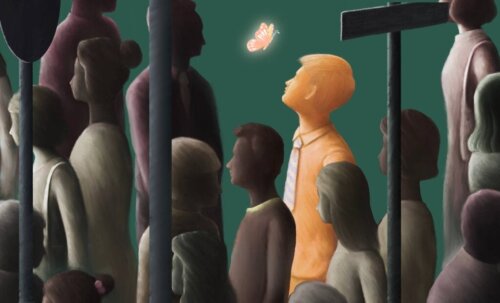The differences between anxiety and stress are blurred in a world where disorders related to these emotions occupy a significant percentage of global prevalence.
For example, in Spain, anxiety affects 6.7% of the population and ranks as the fifth country with the highest level of stress among the members of the European Union. However, these are adaptive emotions that respond to different needs, so it’s important to know how to differentiate them.
In order to improve your ability to introspect and provide clear information about a problem that’s so widespread in the population, we’ll present you with seven differences between anxiety and stress.
What are anxiety and stress?
Stress is a response to an urgent demand from the environment, such as an immediate danger. It aims to accelerate the response to resolve the situation as soon as possible and is done through the activation of the sympathetic nervous system.
In acute situations, stress can be adaptive and beneficial, helping us deal with emergency scenarios. However, when it becomes chronic or acute, it’s clinically significant and can have serious health implications.
Anxiety, on the other hand, is an anticipatory emotion. This means that it’s activated when the person foresees a dangerous situation in the future. The physiological response, dependent on the sympathetic nervous system, is aimed at preventing this situation, not resolving it.
Therefore, anxiety is also an adaptive and useful emotion as long as it isn’t experienced continuously or in the absence of real danger.
Both emotions have a series of similar physical manifestations, making them easily recognizable. These are the following:
- Tremors
- Sweating
- Piloerection
- Bronchodilation
- Pupil dilation
- Disruption of digestion
- Increased heart and respiratory rate
Therefore, it’s convenient to know the differences between anxiety and stress at a cognitive level, as there lies the key to characterizing them and, of course, treating them. Let’s see them in detail.
The differences between anxiety and stress
As both emotional responses are excitatory and related to danger (whether real or anticipated), it’s easy to confuse them or even experience them at the same time. So, pay attention to these specific differences.
1. Origin
While stress comes from a clear and present event, such as an emergency, in anxiety, it’s not as evident. As it has to do with projection into the future, nervous excitement doesn’t have a clear beginning or end.
2. Triggering factors
In the case of stress, the factor that triggers it comes from the environment. That is, the individual faces a situation that requires an immediate response. On the other hand, the factors that trigger a state of anxiety are internal, generated by the fear that the person feels regarding that possible situation that they’re anticipating.
4. Duration of the physiological response
In anxiety, the duration of the effects is complex, as the excitement responds to cognitive factors and can last even if the problematic situation never occurs. However, stress ends when the stimulus that triggers it disappears.
If stress becomes chronic, it’s because the factors that cause it are too many or never end.
5. Intensity of the response
The intensity of stress and anxiety varies, depending on the triggering factors. But, in the first case, it has to do with the perceived severity of the stressful event. When it comes to anxiety, the degree is more subjective and depends on the thoughts of the individual.
6. Severity

Another difference between anxiety and stress is the severity of the mental disorders they cause. The first has a greater scope, as it’s related to phobias or panic disorders, among others.
The severity of stress, both in its acute and chronic forms, is less than that of anxiety. Now, when it comes to organic disorders, such as cardiovascular problems, their severity must also be taken into account.
7. Treatment
These adaptive emotions are treated in different ways in consultation. When stress becomes chronic, treatment focuses on developing coping strategies, such as training in meditation or breathing techniques.
When it comes to anxiety, combined treatment with psychotropic drugs may be necessary. As indicated in this review study shared by the Electronic Journal eNeurología, efforts in therapy will be aimed at overcoming maladaptive beliefs and deactivating avoidance behaviors.
Learn more:
Stress and Meditation: Dr. Daniel López Rosetti
[/atomik- read-too]
Knowing the differences between anxiety and stress is the key to asking for help
As you can see, knowing the differences between anxiety and stress is important, not only on an introspective level. Learning to identify and characterize these differences is the door to better decision-making, as they motivate you to modify the environment and work for the benefit of your own mental health.
In a world where one in eight people suffers from a mental disorder and in which depressive and anxiety disorders have increased by 26% since 2020 (and continue to rise), everything that can be done to improve one’s own emotionality is very well worth it.
Therefore, if you think that your stress is extending too much over time or your anxiety is beginning to paralyze you, don’t hesitate to ask for psychological help. We all deserve good mental health.
The post The 7 Differences Between Anxiety and Stress appeared first on Exploring your mind.




















Comments